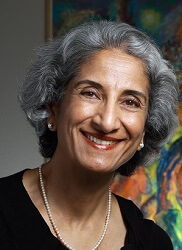Volume 10 Issue 10 October, 2020
KING GEORGE AND QUEEN MARY
As young senior house officers on the medical wards, we worked unlimited hours. Any number of chance events would prolong the day. I describe one such event.
In the early 70s there was not much in terms of psychiatric care practiced on the general wards. Attention was called to patient related incidents causing a great deal of distress. We had one such incident caused by an “Anglo Indian” as the term was, a sailor in the British navy in his 60s who had seen many ports.
He was causing the nuns (administrators) a great deal of concern–yelling out, talking incessantly all night, being hyper sexual, asking the women to sit on his lap, walking without clothes on, using profane language, laughing a great deal without any apparent reason, and al together refusing to cooperate with the staff. I was called to see him at night because they felt he was a nuisance, offensive, and wanted him off the unit. He had been telling them that he had King George on one thigh and Queen Mary on the other and kept calling them to see the royal couple in his bedroom.
On exam, he was clearly in a manic state. I asked him to show me the Royal couple. He did indeed show me the tattooed pictures of the Royals on both thighs. He had served as a sailor in the Royal Navy, with relationships in various sports. He was single, untreated for tertiary syphilis. In the days without current technology, we had to diagnose his condition by doing a lumbar puncture and establishing the diagnosis by careful history taking, and labs, & managing his mania.
What I learned that day was a) to examine a patient without prejudice or rancor, keeping my ears open for any aspect of history that could be missed due to stigma and discrimination; b) that psychiatric illness can be indeed caused by medical conditions affecting the brain; (secondary mania in this case); c) that his meaningful life story and who he was as a person was important for him to relate to us; d) that treatment of the condition was the same as any mania–which we accomplished, and thate) all patients have humane aspects of their lives to offer. Upon recovery, he had many anecdotes of his travels all over the world-much unknown to us.
I discovered I had the makings of a psychiatrist as a house officer and today, I continue to enjoy being one.
Ref:
1. https://en.wikipedia.org/wiki/King_George_and_Queen_Mary
2. deVoux, A., Kidd, S., & Torrone, E.A. (2018). Reported Cases of Neurosyphilis Among Early Syphilis Cases-United States, 2009 to 2015. Sexually transmitted diseases, 45 (1), 39–41.

gjayara1@jhmi.edu
